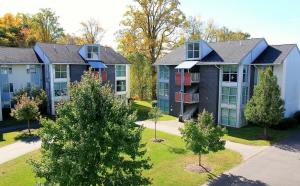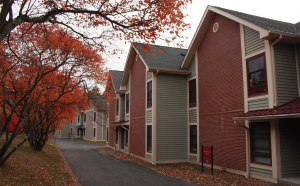Residential Locations:
Students in SLE program reside in the Village and in CPAs. Placement is based on earned credits, as of Fall 2021.
This includes apartment-style living, where students are able to cook for themselves, and live with students who share similar interests. Additionally, SLE participants help maintain to the organic vegetable garden, located behind the Redwood CPA.
Juniors and seniors are eligible to live in the Village, which is close to the Sharp Sustainability Education Center (SSEC). The CPA’s offers occupancy to sophomores through seniors.
- The Village has single rooms, while the CPAs consist of double rooms.
- The Village is separately metered for electricity.
- All the SLE facilities practice composting.
Academic and Learning Opportunities:
The program offers many opportunities to students to foster their interests in building a sustainable community;
- Learn how to grow your own food
- Learn to compost
- Reduce your ecological footprint
- Earn service learning credits and build your resume
- Live with a great ecologically minded community, with many opportunities to hold community events.
- Build connections with local community networks such as MEVO and the NY-NJ Trail Conference.
- Become a community steward and learn effective leadership skills while leading sustainability campaigns on campus.
Benefits to Ramapo College:
- “Green living” decreases operating costs (energy/water savings; increased waste diversion, through recycling and composting, therefore decreased refuse)
- Student engagement in sustainability
- Culture-building
SLE Requirements
Academic Requirement: SLE is a complete service learning program and hence, requires students to register in two 1 unit Independent Study courses for service learning with SLE faculty. These will take the form of:
- Independent Study on Sustainable Living (Fall Semester). This section will focus on: a Reading Seminar, community building, and reducing ecological footprint
- Independent Study on Eco-Stewardship (Spring Semester). This section will focus on building a project to raise awareness about ways of reducing our ecological impact
Eco-Stewardship Requirement: Students will commit to one hour of weekly meetings (on Wednesday evenings, from 5 to 6 pm, based on consensus), 40 hours of community service throughout the academic year, about 20 hours a semester. Ecological leadership work will involve engagement with RA and also student club leaders to promote campus sustainability.
Service opportunities may include:
- Help maintain the vegetable garden and grow your own food
- Help develop and maintain a student composting program on campus
- Explore ways to connect with the local farmers market
- Support the establishment of the Fair Trade Program on campus
- ResLife Recycling liaison to Student Recycling Crew (collect data on volume of recyclables, encourage compliance across Residences)
- Liaison with Ramapo Green, 1STEP, SGA Sustainability Committee, ResLife, etc.
Students will also be expected to be attend sustainability events on campus.
Sustainable Living Requirement: As SLE Program participants, students will be expected to take a leadership role as well as abide by the Ramapo Green Sustainability Pledge. This is geared toward inculcating a green life style and to encourage students to reduce their footprint on campus.
Examples of actions which students are expected to undertake include:
- Grow your own food
- Make sustainable food choices, such as buying locally
- Compost your food scraps
- 100% recycling compliance (paper, cardboard, metal, glass, etc.)
- Improve indoor air quality and limit environmental degradation by using ‘green’ cleaning supplies
- Reduce personal carbon footprint
- By taking fewer single-occupancy car trips – carpool; combine trips
- By using public transit
- By conserving energy (electricity, heat) and water
Sustainable Living Eco-Stewardship Agreement
Students who are participating in the SLE Program are expected to abide by all Office of Residence Life policies, procedures and housing requirements. For your reference, please refer to the Guide to Community Living and Student Handbook, which is listed on the Residence Life Website. In addition to the regular Housing agreements, students applying to live in the SLE also agree to:
- Commit to living in the SLE for the entire academic year (Fall and Spring semesters)
- Complete the SLE Application and Contract, available below.
- Sign up for a one unit Independent Study, both in the Fall and Spring Semesters, after selection to the Program (Contact Dr. Sangha Padhy for additional information).
Significant violations of this Agreement will result in ineligibility to live in SLEs in future semesters.



Follow Ramapo Green